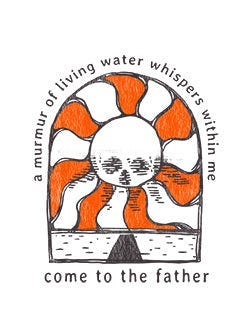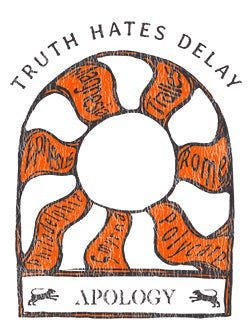Ignatius of Antioch is a central figure in my story of faith, so I thought I’d make a shirt to encapsulate a bit of his story. But first…
Years ago, I was occasionally asked to lead Sunday and Wednesday night classes at our small, rural church. Growing up in such an environment was wonderful, but we had no teaching in theology or Christian history. The general idea was to take the bible and apply it to our lives.
That’s great as far as it goes, but I loved history, and where things come from was important to me, so I naturally started asking questions. That led to my reading various portions of church history.
There I discovered stories of people that I’d never heard of. Some parts seemed fantastical, but the core was irresistible.
And so I came to Ignatius of Antioch.
There are so many places online to read about him (well, really, just read the letters he wrote along the way to Rome to die). A quick search pulls up more than you’d want to read, probably, so I will not re-tell his story here. A few links that are useful to me are listed at bottom.
Do yourself a favor. Read what he wrote.
“Earthly longings have been crucified (ho emos erōs estaurōtai) and in me there is left no spark of desire for mundane things, but only a murmur of living water (hydōr zōn) that whispers within me, ‘Come to the Father’.”
Hauntingly beautiful. Those words have hung in front of my mind since I read them years ago.
The idea that a picture of death loomed in front of Ignatius is what inspired the images on the front and back of this shirt. I imagined Ignatius traveling under guard along a bumpy road, wobbling with every step of the horses that pulled his cart (he may have sailed, but still…), thinking of his beloved children in the faith, how they would intervene to save him, how he must have longed for them, how gruesome the specter of being eaten alive surely was, and how much he wanted to be with Jesus.
Listen to this quote from a letter:
“Allow me to become food for the wild beasts, through whose means it will be granted me to reach God. I am the wheat of God, and am ground by the teeth of the wild beasts, that I may be found the pure bread of Christ.”
Pure Bread. The Wheat of God. Amazing.
He sent 7 letters. This part of the story is what makes up most of the back graphic. That he was to be thrown to wild beasts to die under tooth and claw is represented by the 2 lions on either side of the brand name, Apology.
TRUTH HATES DELAY is something I ran across while searching for ancient Roman quotes. In Latin it is, “Veritas Odit Moras.”
Ignatius of Antioch learned from the Apostle John. He and his friend, Polycarp, I believe were both disciples of John. That’s amazing! To have such a close account of the early church was very influential in my life. Read through the links at bottom, especially www.earlychristianwritings.com, which is a treasure trove.
HISTORY — First epistle of Clement Chapter XIII. — An exhortation to humility
Let us therefore, brethren, be of humble mind, laying aside all haughtiness, and pride, and foolishness, and angry feelings; and let us act according to that which is written (for the Holy Spirit saith, “Let not the wise man glory in his wisdom, neither let the mighty man glory in his might, neither let the rich man glory in his riches; but let him that glorieth glory in the Lord, in diligently seeking Him, and doing judgment and righteousness”55), being especially mindful of the words of the Lord Jesus which He spake, teaching us meekness and long-suffering. For thus He spoke: “Be ye merciful, that ye may obtain mercy; forgive, that it may be forgiven to you; as ye do, so shall it be done unto you; as ye judge, so shall ye be judged; as ye are kind, so shall kindness be shown to you; with what measure ye mete, with the same it shall be measured to you.”56 By this precept and by these rules let us establish ourselves, that we walk with all humility in obedience to His holy words. For the holy word saith, “On whom shall I look, but on him that is meek and peaceable, and that trembleth at My words?”57 —
C.S. Lewis on reading modern works as opposed to older works:
Naturally, since I myself am a writer, I do not wish the ordinary reader to read no modern books. But if he must read only the new or only the old, I would advise him to read the old. And I would give him this advice precisely because he is an amateur and therefore much less protected than the expert against the dangers of an exclusive contemporary diet. A new book is still on its trial and the amateur is not in a position to judge it. It has to be tested against the great body of Christian thought down the ages, and all its hidden implications (often unsuspected by the author himself) have to be brought to light.
— C.S. Lewis, Excerpt from the Preface to On the Incarnation by St. Athanasius the Great (Popular Patristics Series Edition)
ANCIENT HYMN
Basil (ca. 330 — 379) spoke of the singing of the Phos Hilaron as a cherished tradition of the church, the hymn being already considered old in his day (though some attribute the composition of the song to St Basil himself).
O Gladsome Light of the holy glory of the Immortal Father, heavenly, holy, blessed Jesus Christ. Now we have come to the setting of the sun and behold the light of evening. We praise God: Father, Son, and Holy Spirit. For it is right at all times to worship Thee with voices of praise, O Son of God and Giver of Life, therefore all the world glorifies Thee.
SCRIPTURE
Exodus 24:12–18
Then the Lord said to Moses, “Come up to Me on the mountain and be there; and I will give you tablets of stone, and the law and commandments which I have written, that you may teach them.”So Moses arose with his assistant Joshua, and Moses went up to the mountain of God. And he said to the elders, “Wait here for us until we come back to you. Indeed, Aaron and Hur are with you. If any man has a difficulty, let him go to them.” Then Moses went up into the mountain, and a cloud covered the mountain. Now the glory of the Lord rested on Mount Sinai, and the cloud covered it six days. And on the seventh day He called to Moses out of the midst of the cloud. The sight of the glory of the Lord was like a consuming fire on the top of the mountain in the eyes of the children of Israel. So Moses went into the midst of the cloud and went up into the mountain. And Moses was on the mountain forty days and forty nights.
Luke 9:28–36
Now it came to pass, about eight days after these sayings, that He took Peter, John, and James and went up on the mountain to pray. As He prayed, the appearance of His face was altered, and His robe became white and glistening. And behold, two men talked with Him, who were Moses and Elijah, who appeared in glory and spoke of His decease which He was about to accomplish at Jerusalem. But Peter and those with him were heavy with sleep; and when they were fully awake, they saw His glory and the two men who stood with Him. Then it happened, as they were parting from Him, that Peter said to Jesus, “Master, it is good for us to be here; and let us make three tabernacles: one for You, one for Moses, and one for Elijah” — not knowing what he said. While he was saying this, a cloud came and overshadowed them; and they were fearful as they entered the cloud. And a voice came out of the cloud, saying, “This is My beloved Son. Hear Him!” When the voice had ceased, Jesus was found alone. But they kept quiet, and told no one in those days any of the things they had seen.
I hope these snippets from Christianity serve as refreshment for your spirit.
Clement epistle — https://ccel.org/ccel/clement_rome/first_epistle_to_the_corinthians/anf01.ii.ii.xiii.html
http://www.earlychristianwritings.com/ignatius.html
https://christianhistoryinstitute.org/incontext/article/ignatius
https://www.equip.org/?s=ignatius+of+antioch
https://www.christianitytoday.com/history/people/martyrs/ignatius-of-antioch.html
https://orthodoxwiki.org/Phos_Hilaron





